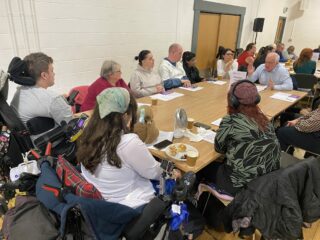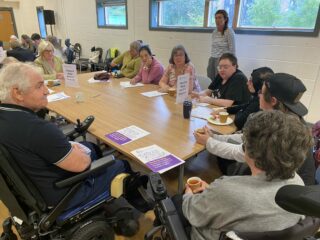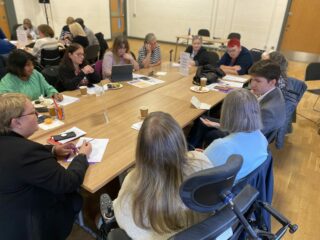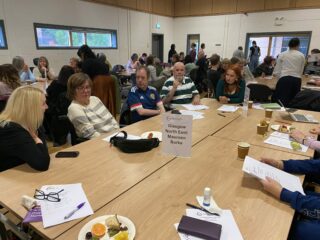This is a copy of our e-bulletin distributed on 17 July 2025. To subscribe, click here.
On the 9th of July, disabled people were alarmed and devastated at the passing of the UK Government’s Universal Credit Bill in the House of Commons. This third reading was the most recent step in what has proved to be an arduous and contentious legislative journey, intended to cut disability benefits and balance the books on the backs of sick and disabled people. The UK Government had to make massive concessions at the second reading of what was then titled the ‘Universal Credit and Personal Independence Payment Bill’. Forcing these concessions were a win for Disabled People-led Organisations (DPOs) and disabled people who campaigned vigorously, however, the fear is that cuts have merely been delayed, with crushing consequences for disabled people in England and Wales in the shorter term and eventually and, potentially, in Scotland.
It was no surprise that these reforms were met with outrage fuelled by fear and anger at the blatant targeting of disabled people. The UK Government’s Pathways to Work Green Paper outlined a self-imposed target of £5 billion cuts, which the UK Government itself said would push at least 250,000 disabled people further into poverty. Moreover, the Office of Budget Responsibility declared that there was absolutely no evidence that these reforms would create “pathways to work”. In fact disabled people, our organisations and many others feared the opposite: that these cuts would drive some disabled people out of work by removing vital support.
The process itself was staggeringly lacking in disabled people’s or DPOs’ involvement. Not one disabled person or organisation led by disabled people was involved in the development of the proposals, and many of the major changes proposed in the Green Paper were not consulted on. In fact, these were presented as a fait accompli, via the Universal Credit and Personal Independence Payment Bill.
Changes originally proposed included:
- Changing eligibility for PIP so that four points would have to be scored on at least one daily living activity to receive the daily living element of the benefit. This would have resulted in hundreds of thousands of people losing entitlement – people who need support to wash, dress, take medicine and eat.
- Freezing the health element of UC for existing claimants, and reducing it by nearly 50%for new ones.
- Scrapping the Work Capacity Assessment to replace it with a new, single assessment based on the PIP one, despite it being designed to evaluate a disabled person’s care and mobility support needs, not assess someone’s capacity to work. Problematically, this conflated PIP, which is for the extra costs of disability, with unemployment support which is a work-related benefit.
- Denying the health element of Universal Credit to those under the age of 22 relegating young disabled people to increased poverty of money and of opportunities.
- Rationing the Access to Work scheme which enables thousands of disabled people to attain and maintain employment.
Disabled people, disabled leaders and disabled people led organisations protested prolifically, supported by our families, anti-poverty organisations and wider allies. MP mailbags and inboxes were “bursting at the seams” and “overflowing” as concerned constituents wrote in their thousands in an outpouring of opposition rarely seen about a policy proposal.
At the point of publication of the Green Paper, GDA members mounted a grassroots campaign, amplifying the tsunami of anger, fear and distress which was being expressed around the country. Many described their own experiences of how the threatened benefits enabled them to live fuller, more independent lives, and the devastating impact the cuts would have on them.

When it became apparent the proposals were extremely unpopular and controversial, many MPs began to express disquiet. An amendment to the Bill was put forward which, if successful, would have scrapped it by denying it a second reading. Over 120 MPs signed the amendment and so, in a desperate attempt to get the Bill through, the Government offered concessions. The main compromise was that current claimants would be protected from the PIP 4-point rule, which instead would only affect new claimants from November 2026.
While some described this as a humiliating climb down for the Government, the concessions are too little, too late. The fact they were being made while the debate was taking place, even to the point at which MPs were heading to vote, shows this was a rushed, ill-thought through process. Also, if the plan to impose the changes to new claimants went ahead, it would create a two-tier system, bringing about situations in which someone applying for PIP for the first time could be denied support, despite having the same needs as existing claimants. In short, this was terrible policy making and lousy legislating.
In the end, the Bill passed its second reading with 335 MPs voting in favour of it continuing the Committee Stage and third reading. 260 MPs voted against the Bill, including 49 Labour MPs. The majority of the ‘rebels’ who had signed the amendment that would have scuppered the Bill, were convinced enough by the concessions to fall into line.

On Friday 4th July, GDA members from our Drivers for Change Network, met with some Glasgow MPs. Patricia Ferguson, MP for Glasgow West; Gordon McKee, representing Glasgow South; and Martin Rhodes, MP for Glasgow North, attended the session. Staff from the offices of Zubir Ahmed (Glasgow South West), Maureen Burke (Glasgow North East) and John Grady (Glasgow East) were also present.
Disabled people voiced concerns using creative methods and GDA’s Purple Poncho Players delivered a powerful performance highlighting disabled people’s poverty and connections with social care, work, benefits and a disabling world around us.
GDA CEO, Tressa Burke, told the MPs at our event, they need to stop balancing the nation’s books off the back of sick and disabled people:
“We firmly believe that the burden of financial crisis should not be placed on the shoulders of those least able to bear it and most in need of protection and a safety net – the kind that was established when we set up the NHS and welfare state and established this universal social protection that we all need and benefit from in times of hardship.”
Of the three MPs in the room, Patricia Ferguson and Martin Rhodes had signed the amendment that would have put an end to the Bill by denying it a second reading. Maureen Burke had also signed it. However, all six of the MPs with a presence at the meeting, had voted with the Government allowing the Bill to go to the next stage. The event provided the ideal opportunity for GDA members to ask their MPs to justify their votes. Overall, the concessions made, and the Government’s stated intent to consult with disabled people and DPOs going forward, were enough to persuade those who had reservations to vote for the Bill.

The week following our Meet the MPs event saw the third reading of the Bill on Wednesday 9th July. It now made no mention of PIP, hence the Bill’s change of name, and no changes will be made to PIP until after a review of it currently being conducted by the Disability Minister, Stephen Timms, has concluded. This is expected to be in autumn 2026. However, the health element of Universal Credit for new claimants will be severely cut and frozen and trust in the Timms Review has been undermined by the process so far and the lack of involvement of disabled people.
At the third reading, 47 labour MPs voted against the Government. It does seem that one of the Glasgow MPs listened to what disabled people had to say at the round table discussions where MP staffers and MPs themselves took copious notes. Having heard from GDA members, Maureen Burke ultimately voted against the Bill. In a letter explaining her decision, she said she was particularly concerned about:
“[T]he cuts for new claimants to the Health Element of Universal Credit, which by 2029 could lead to 750,000 disabled people receiving£3,000 less per year to pay for food, rent, utility bills, and other essentials. It is for this reason that I could not vote in favour of the bill.”

The Bill now goes to the House of Lords, and disabled people and DPOs will continue to oppose and fight the reforms in it, with not one DPO in the UK supporting the proposals.
GDA members firmly believe that, instead of focussing on cutting benefits and making disabled people poorer, those in power must address the many and interconnected barriers disabled people face. Actions are urgently needed to tackle disabled people’s poverty and provide support for those who can and want to work. As Tressa Burke told Gary Robertson of BBC Radio Scotland’s Good Morning Scotland on the day of the second reading vote:
“There are so many things that need to join up…We need to look at all the barriers disabled people face in a world that’s not been designed with us in mind. So learning, social care, transport and the vital support of other people in the same boat provided by Disabled People-led Organisations. We need a system that’s fair and compassionate and protects people in their lives when they face hardship.”
If MPs are sincere about involving disabled people in co-producing any further disability benefits reforms, they must properly listen and engage with us.
They must do what they were elected to do:
- thoroughly scrutinise any legislation
- hold the government to account
- represent their disabled constituents, our families and our allies
- and promote policies and legislation that up hold dignity and support disabled people to live lives of meaning and participation.
Related Articles
‘Future Visions for Social Care:’ What is next for Social Care Reform in Scotland?
On Friday 14th March, 180 disabled members of Glasgow Disability Alliance and external partners met online and in person for our ‘Future Visions for Social Care’ event. The session centred on social care reform in light of the Scottish Government’s new Care Reform (Scotland) Bill, previously the National Care Service (Scotland) Bill (NCS).
Read More
Care About Us: Disabled People in Glasgow Call For Radical Reform in Social Care Campaign
“Radical action is needed now to ensure disabled people are listened to and necessary changes are made to what social work themselves describe as a…
Read More
Stop Cuts to Social Care Budget!
Stop Cuts to Social Care Budget which will erode Legal Rights and Protections for Glasgow’s disabled and older people. This morning (Wednesday 22nd March), members…
Read More




